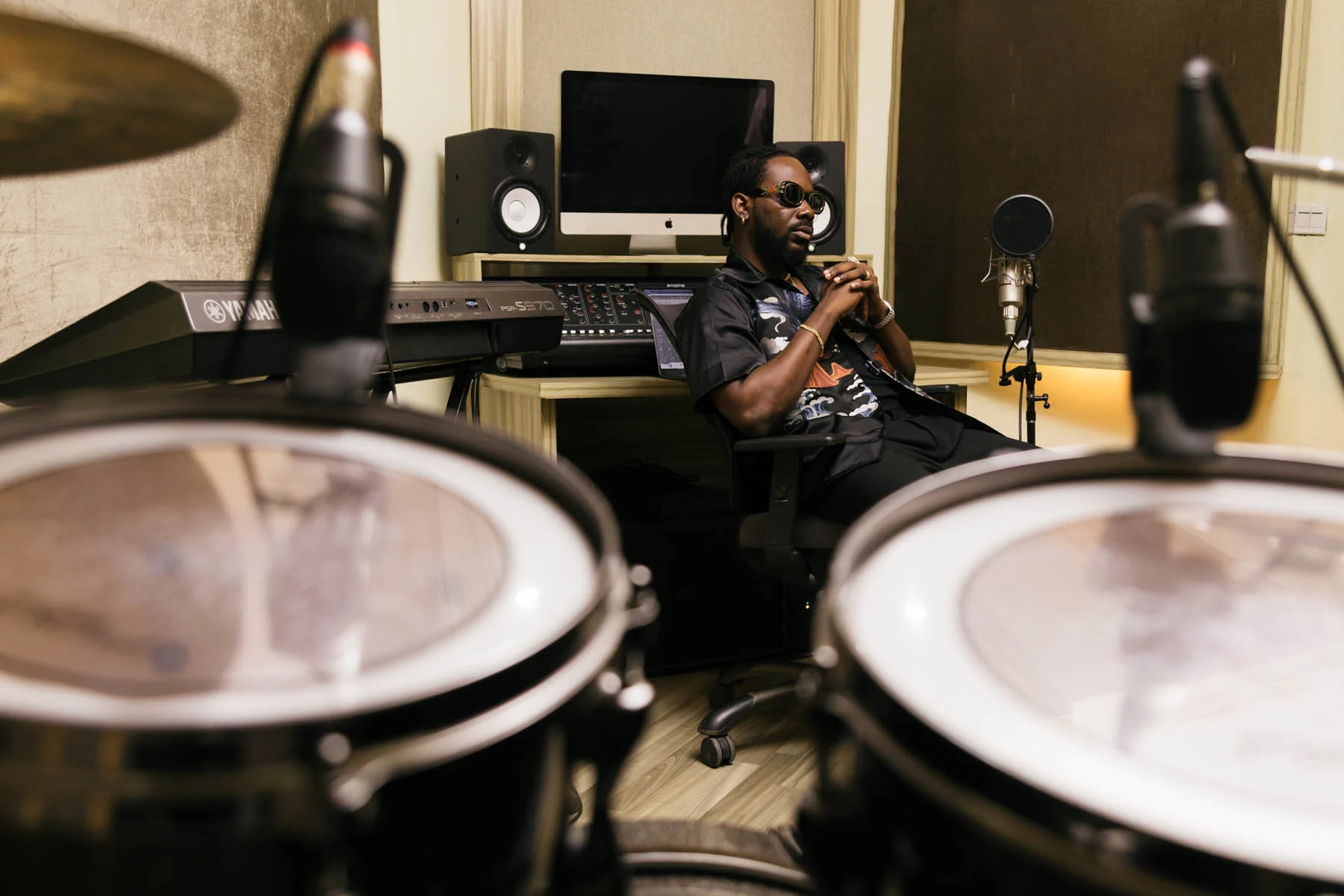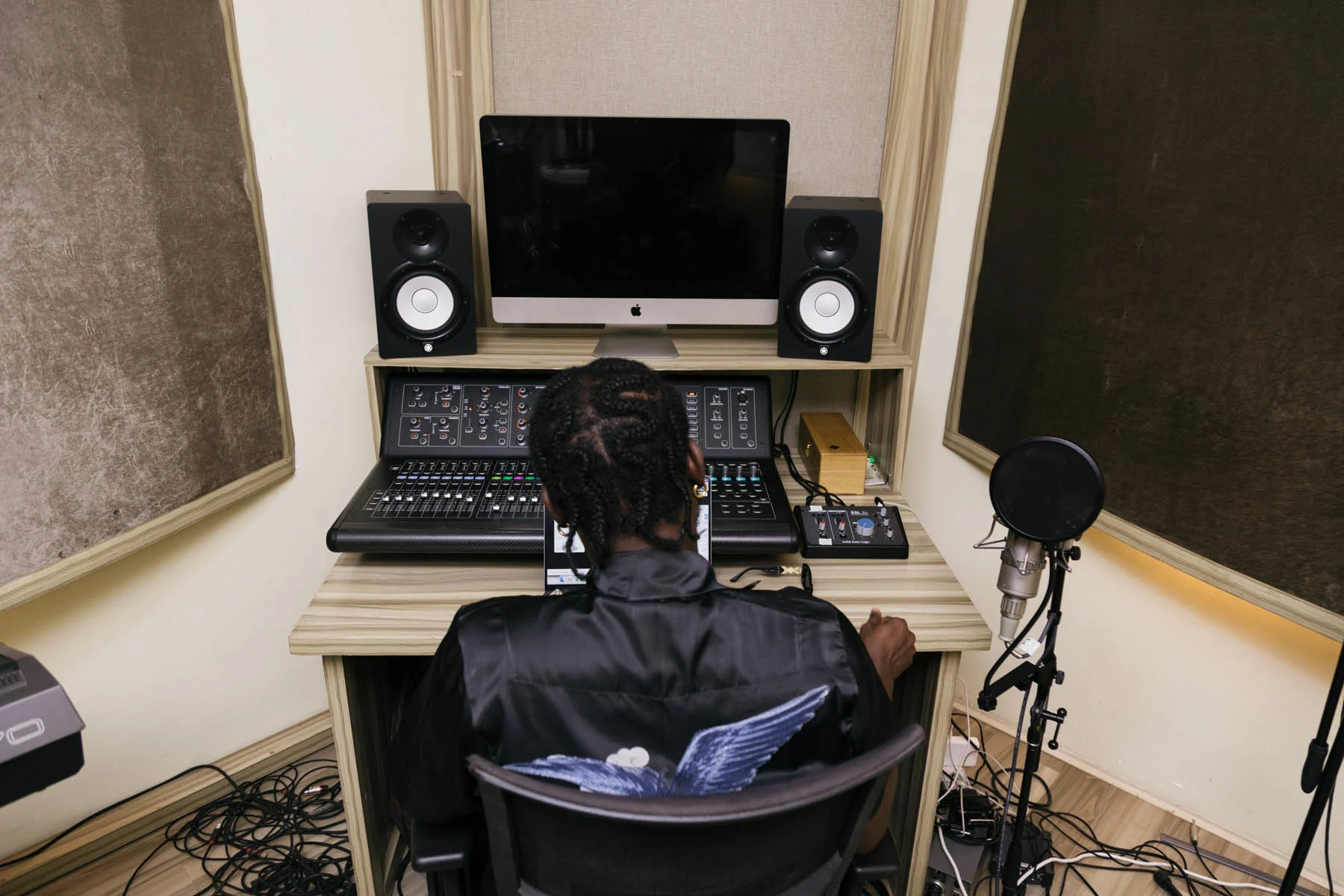

There’s no place like home — at least that’s what Afrobeats musician Adekunle Gold believes. Few know Lagos, Africa’s megacity, as well as him, born, bred and still living in the bustling vibrancy of his favorite city in the world. Writer Jareh Das spoke to Adekunle to learn how growing up in Lagos informed both his spirit and his music, the best spots to visit, eat and party, and why artists want to come to soak in the atmosphere and hopefully absorb some of that famous Lagosian drive to succeed.
Watch the film below

As you drive around Lagos, street hawkers dart through traffic-strewn roads offering everything for sale from foodstuff to paintings; steering-wheel covers to air fresheners; mobile phone top-up vouchers and every book imaginable. You can buy almost anything in Lagos traffic as opportunities to buy and sell are limitless. Luxury gated communities, shanty towns, and formal and informal economies exist side-by-side in Africa’s most populous megacity, a visual representation of the staggering wealth gap dividing up its approximately 20 million people. But one thing that every Lagosian will agree on is that the hustle has no bounds and the party never stops.
Once the weekend arrives, owambe parties are common, and clubs are packed out to the max. Both of these outings involve large groups of people of all ages, all united by stamina that keeps them dancing late into the night until dawn. Everyone is always ready to party and celebrate as mega weddings take over large event venues, while ubiquitous private buses play loud music on the streets. The area under the bridges become gathering sites for block parties, informal art galleries and more street hawking. In Lagos, every space becomes a site for fiestas of different scales.

This busy, jostling lifestyle is reflected in a culture that speaks about everyday realities and contemporary life, and it is no more evident than in the worldwide explosion of Nigerian Afrobeats. Afrobeats (not to be confused with Afrobeat originating in the 1960s) began at the turn of the millennium and is mostly a blend of West African rhythms (local pidgin, indigenous languages, jùjú music, highlife and varied instrumental beats) with influences from the Black diaspora, like UK Grime, American hip-hop and dancehall from the Caribbean. Since the late 2010s, Lagos, Accra and London have since become major hubs for Afrobeats music and its musicians who have now gained mainstream success globally.
One such Nigerian musician—now critically acclaimed worldwide—is the multi-faceted Afrobeats singer-songwriter, Adekunle Almoruf Kosoko aka Adekunle Gold aka AG Baby. He is the epitome of a Lagosian born and bred success story, living on the Mainland of Lagos as opposed to the Island, which many view as the real and authentic Lagos. Adekunle also boasts an impressive heritage as a descendant of the Kosoko royal family whose patriarch reigned as Oba of Lagos between 1845-1851.
Royal titles and history lessons aside, Adekunle has made his name within the global Afrobeats scene for his distinct fusion of melodies that rely on traditional percussion, bass guitar, sax, and untainted lyrical storytelling. He has worked professionally in music since 2010, though his breakthrough came in 2015 with the hit single “Sade” a highlife cover of One Direction's “Story of My Life” that went viral.
Early albums like “Gold” drew heavily on highlife influences informed by his love for Nigerian Fuji, a musical genre popularized by legends like Ebenezer Obey and King Sunny Ade and celebrated for its percussive and up-tempo style powering dance floors all over metropolises from Lagos to Ibadan and particularly popular in the 1960s following Nigeria’s independence from British colonial rule. Today, Adekunle’s sound has expanded beyond national borders blending fuji, hip-hop, grime and amapiano evident in his 2022 album, “Catch Me If You Can”, which featured major names like Davido, Ty Dolla $ign, Stefflon Don and Lucky Daye.


While he may now be traveling the world to perform, Adekunle’s home city of Lagos is where everything began. As a child, he grew up in a creative household with an artist father and sang in his local church choir. He then went on to study at art school which led to his time as a graphic designer, earning him the moniker by his online followers as the “King of Photoshop” thanks to his witty memes merging comical poses of himself with celebrities like Nicki Minaj, Kim Kardashian and even the Mona Lisa.
Adekunle’s childhood was filled with weekends at Bar Beach (now redeveloped as a luxurious urban waterfront district) and Apapa Amusement Park. School trips took him to cultural sites like the National Theatre and the National Museum Onikan to learn about Nigerian history and culture. Creativity came to him early though, as he learned how to paint as a young boy from his father. “As a kid, I was very lucky growing up with an artist father who sculptured, painted, and made ceramics,” he explained on a video call from Lagos. “I learned from him at home about all the greats in art history from Picasso to Michelangelo, and ironically, he also taught me in secondary school as he was also my Fine Art teacher, although it was impossible to get his attention for the work I did there,” he says with a laugh.
"Even though as a kid, I was encouraged by [my father] to make as he did, I still didn’t think that I would take up art beyond secondary school as I had my sights set on becoming a lawyer. I did, however, end up studying art and design and majoring in graphics at Lagos State Polytechnic. It was there that I immersed myself in everything from textiles to graphics, painting to ceramics and sculpture but my love for graphics blossomed as I enjoyed coming up with ideas for communicating this way as far back as 2004 and which I continue developing today.”

Adekunle subsequently finished art school after a period interning at Lagos Television (LTV) which left indelible marks on his creative vision as he learned about set design, TV production and digital media skills. This helped him develop as a visual communicator working on graphics for private and corporate clients while trying to break through as a musician traveling across the city for work opportunities and expanding his network.
“Because I was working for agencies and in entertainment, I would go to industry nights all across Lagos. “One Mic Naija” on the Mainland on Wednesdays and Sundays was where I regularly watched people perform,” he remembers. “It drew a lot of superstars, and it also fed my hunger to work in music and become an entertainer.” In the area he lived, life was more about local beer and pepper soup joints where he would watch local musicians put on live shows. “I am very interested in really engaging on a street level to connect to how people speak and move within the city. It’s also really important to connect with regular people, to hear their thoughts, their struggles, and their joys, and to stay grounded. This feeds into who I am and what I do.”

Lagos gives you this energy, you don’t have a choice but to become a part of this drive to succeed in whatever you do.
Adekunle’s rise as a musician has meant his relationship with Lagos often sees him move from spaces with musical street cred like BogoBiri (where he disclosed he met his wife and fellow musician, Simi) and New African Shrine to exclusive members clubs that offer privacy for VIP clientele. He rates Lagos’s food and drink culture as one of his favorites in the world. He sips tequila on the rooftop of Eko hotel yet buys sausage roll (Gala) snacks in traffic. Regular fast food joints like Bukka Hut are a go-to for a range of Nigerian dishes like suya and amala, while upmarket restaurants like NOK by Alara and Slow are a must for trying out the best in contemporary Pan-African and Western fusion dishes.
Lagos, from Adekunle’s perspective, blends low and high culture and holds many contradictions due to its relentless traffic, inflated prices, and continually challenging economic situations. One thing that he and other Lagoisans firmly abide by is this relentless drive to go on regardless. It’s about working hard and about survival, yet it is also a city where the community counters hardships by gathering together around food, music and celebrating.

“There’s a hunger that all of us have in Lagos that’s quite hard to put into words,” says Adekunle. “The city gives you this energy and when you grow up in Lagos, you don’t have a choice but to become a part of this drive to succeed in whatever you do.” He speaks of meeting people on his travels who are so desperate to come to the city to make music and experience for themselves the energy, humour, contradictions and positivity musicians from Lagos embody through their lyrical storytelling of city life. They want to be around this infectious and ambitious spirit, one that insists you either find your opportunity or make it from scratch.
Adekunle, like many other Nigerian musicians, fashion designers and artists continue to create art that challenges the stereotypes of what it means to be an African creative today. In his song “Win”, Adekunle sings: “Winning so sweet, I’m not tryna lose...Don’t wanna go down, Omo I refuse…Ahead ahead I dey run my race.” For me, these words reflect this city with a striking familiarity: in Lagos, time waits for no one, and if you waste time, you get left behind.

